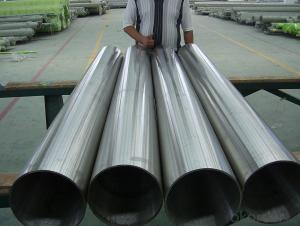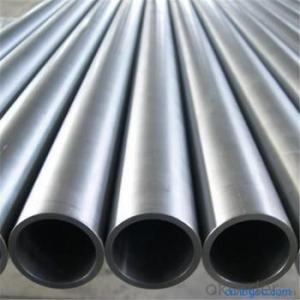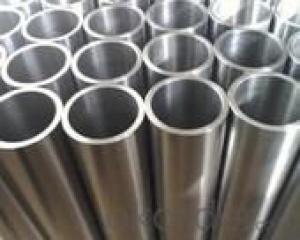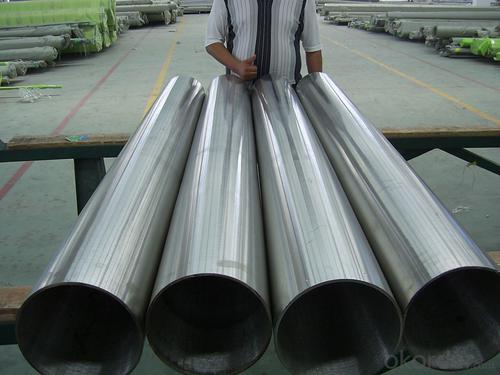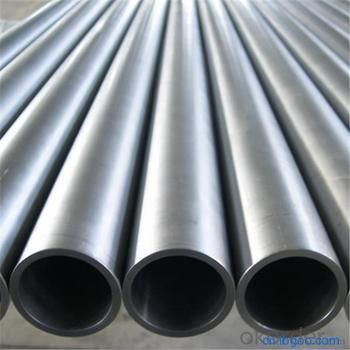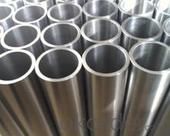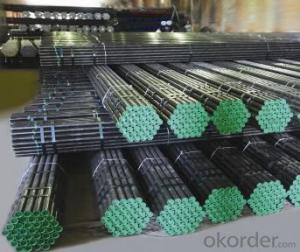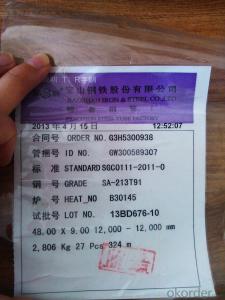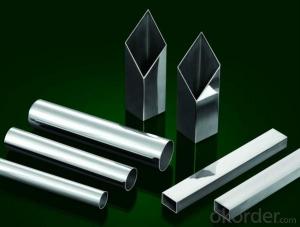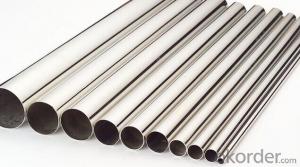ASTM A213 T91 boiler tube 2321
- Loading Port:
- Shanghai
- Payment Terms:
- TT OR LC
- Min Order Qty:
- -
- Supply Capability:
- 30000 kg/month
OKorder Service Pledge
OKorder Financial Service
You Might Also Like
Alloy pipe stock grade A335P11/P22/P12/P91/P92/P9/P5 A213 T11/T22/T12/T91/T91/T9/T5
T91 alloy pipe is America national tree like ridge and America combustion new martensitic heat-resistant steel engineering company metallurgical materials laboratory research work. It is to reduce the carbon content of 9Cr1MoV steel on the basis of the content of sulphur, phosphorus, strictly limit the vanadium, niobium, adding small amount of alloying elements.
The number of K90901 T91 alloy tube
T91 alloy tube
T91 alloy pipe specifications: 8-1240 x 1-200mm
Overview of T91 alloy tube:
T91 alloy tubes for ferrite and Olympic alloy steel seamless steel tube boiler, overheating and heat exchanger belongs to (ASTM A213 / A213M-07a)
Use:
For low and medium pressure boiler (work pressure is generally not more than 5.88Mpa, the operating temperature at 450 DEG C) of the heating surface tube; used for high pressure boiler (work pressure is generally above 9.8Mpa, operate at a temperature of 450 DEG to 650 DEG C between) the heating surface tubes, economizer, superheater, reheater, petrochemical industrial pipe.
Heat treatment of T91 alloy tube:
The final heat of T91 treatment for normalizing and high temperature tempering, normalizing temperature 1040 C, the holding time of not less than 10 min, the tempering temperature is 730 to 780 DEG C, the heat preservation time is not less than 1h, the final heat treatment on Microstructure of tempered martensite
- Q: How do steel pipes handle high-pressure applications?
- Steel pipes are able to handle high-pressure applications due to their inherent strength and durability. The material properties of steel, such as its high tensile strength and resistance to deformation, allow it to withstand the intense pressure exerted on the pipes. Additionally, steel pipes can be manufactured with thick walls and seamless construction, further enhancing their ability to handle high-pressure environments. Overall, the robust nature of steel pipes makes them a reliable choice for various industrial applications requiring high-pressure resistance.
- Q: Can steel pipes be coated for additional protection?
- Yes, steel pipes can be coated with various materials to provide additional protection against corrosion, abrasion, and other environmental factors. Coatings such as epoxy, polyethylene, and zinc can be applied to enhance the durability and lifespan of steel pipes, making them suitable for diverse applications in different industries.
- Q: Can steel pipes be used for both high-pressure and low-pressure systems?
- Yes, steel pipes can be used for both high-pressure and low-pressure systems. Steel pipes are known for their strength and durability, making them suitable for various applications. They are capable of withstanding high pressures without deformation or leakage, while also being reliable for low-pressure systems.
- Q: How are steel pipes inspected for defects?
- Steel pipes are typically inspected for defects using various non-destructive testing methods such as ultrasonic testing, magnetic particle inspection, and visual inspection. These techniques help identify any cracks, corrosion, or other defects in the pipes, ensuring their structural integrity and quality.
- Q: What is the difference between steel pipe and copper pipe?
- The composition and properties of steel pipe and copper pipe are what set them apart. Steel pipe is made from carbon steel, an alloy of iron and carbon, while copper pipe is made from naturally occurring copper. Durability is a key distinction. Steel pipe is renowned for its strength and resilience, making it suitable for high-pressure situations and harsh environments. It is highly resistant to corrosion, ensuring its longevity. On the other hand, copper pipe is prized for its malleability and ease of installation. It is not as durable as steel and can corrode over time, particularly when exposed to certain chemicals or aggressive water conditions. Another difference lies in thermal conductivity. Copper pipe is an exceptional heat conductor, making it perfect for applications requiring efficient heat transfer, such as plumbing systems for hot water supply. Conversely, steel pipe has lower thermal conductivity compared to copper, which may affect its performance in specific applications. Cost is also an important factor. Copper pipe tends to be pricier due to the higher cost of copper as a raw material. Moreover, installing copper pipe necessitates specialized tools and techniques, which can increase overall expenses. Conversely, steel pipe is often more cost-effective and easier to work with, making it a popular choice for various applications. In conclusion, the primary discrepancies between steel pipe and copper pipe encompass their composition, durability, thermal conductivity, and cost. Each type possesses its own advantages and disadvantages, and the selection between them hinges on the specific requirements of the given application.
- Q: What is an electric welded pipe (EFW)? Seek help!
- According to the operation requirements of the electric welding machine, connect the lead wire and set up the proper welding parameter of the electric welding machine, which can be operated by manual or automatic two input methods.After checking, start the electric welding machine and enter the welding process. When the welding time is reached, the machine will automatically enter the cooling state.When the pipe completely removed after cooling, electric fusion welding machine.Cutting the pipe with the cutting tool of plastic pipe or fine toothed saw with cutting guide device, and making its end face perpendicular to the axis of pipe. Remove the edges of the edges with a knife, scrape the weld area in the pipe or spigot end and clean the weld area.Should use the special fixture as far as possible to secure the components to be connected, and the roundness of the pipe shall not exceed 1.5% of the outer diameter of the pipe, or it should be corrected on the corresponding fixture.
- Q: What are the different types of pipe fittings used with steel pipes?
- Some of the different types of pipe fittings used with steel pipes include elbows, tees, couplings, unions, flanges, and reducers.
- Q: What's wrong with the 3PP anticorrosive steel tube?
- PP and PE are similar in processability, and the 3PE coating can be used to produce 3PP coatings without the need for a special 3PP coating line. However, the difference between PP and PE materials makes the 3PP and 3PE coatings show different properties, which can be applied to different environments. The advantages of 3PP coating on some properties make it possible to play an important role in the field of 3PE coating. Therefore, many foreign pipeline projects use 3PP anticorrosive coating.
- Q: How do you measure the diameter of a steel pipe?
- To measure the diameter of a steel pipe, you can use a few different methods depending on the available tools and accuracy required. Here are a few common ways to measure the diameter: 1. Calipers: The most accurate method is to use a set of calipers. Open the calipers to their maximum width and then gently close them around the pipe until they fit snugly. The measurement shown on the calipers will be the diameter of the pipe. 2. Tape measure or ruler: If you don't have calipers, you can use a tape measure or ruler. Wrap the tape measure or ruler around the circumference of the pipe, making sure it is snug but not too tight. Divide the measurement by pi (3.14) to get the diameter. This method may not be as accurate as calipers, but it can give you a rough estimate. 3. String or flexible tape: Another option is to use a piece of string or flexible tape. Wrap the string or tape around the circumference of the pipe and mark where it overlaps. Measure the length of the marked section using a ruler or tape measure. Divide this measurement by pi (3.14) to determine the diameter. 4. Pipe gauge: A pipe gauge is a specialized tool designed specifically for measuring pipe diameter. It consists of a series of circular holes with corresponding diameter labels. Simply insert the pipe into the hole that best fits, and the label will indicate the diameter. Remember, it is essential to measure the diameter at multiple points along the pipe to account for any irregularities or inconsistencies. For accurate measurements, it is recommended to take multiple readings and calculate an average diameter.
- Q: What are the factors affecting the price of steel pipes?
- The price of steel pipes can be influenced by various factors. These factors encompass: 1. Raw material expenses: The cost of raw materials like iron ore and coal significantly influences the price of steel pipes. Fluctuations in commodity prices can impact the overall production cost and subsequently affect the selling price. 2. Supply and demand dynamics: The price of steel pipes is determined by the interplay of supply and demand. When there is high demand and limited supply, prices tend to rise. Conversely, an oversupply and low demand can lead to price decreases. 3. Production and manufacturing costs: The direct impact of production and manufacturing expenses on steel pipe prices cannot be overlooked. Costs related to labor, energy, transportation, and equipment maintenance all contribute to the overall production cost and, consequently, the selling price. 4. Market competition: The level of competition within the steel pipe industry also influences prices. Increased competition among manufacturers and suppliers can result in more competitive pricing. Conversely, fewer competitors may lead to higher prices due to limited options. 5. Government policies and regulations: Government policies and regulations exert a significant influence on steel pipe prices. Import tariffs, trade restrictions, and environmental regulations can all affect production costs and subsequently impact prices. 6. Currency exchange rates: Currency exchange rates can also sway steel pipe prices. Fluctuations in exchange rates between countries can impact the cost of importing or exporting steel pipes, which in turn affects their selling price. 7. Global economic conditions: The overall state of the global economy can have repercussions on steel pipe prices. During periods of economic growth, demand for steel pipes may increase, leading to higher prices. Conversely, economic downturns can result in decreased demand and subsequently lower prices. It is vital to acknowledge that these factors can interact and fluctuate over time, making the pricing of steel pipes a complex and ever-changing process.
Send your message to us
ASTM A213 T91 boiler tube 2321
- Loading Port:
- Shanghai
- Payment Terms:
- TT OR LC
- Min Order Qty:
- -
- Supply Capability:
- 30000 kg/month
OKorder Service Pledge
OKorder Financial Service
Similar products
Hot products
Hot Searches
Related keywords
